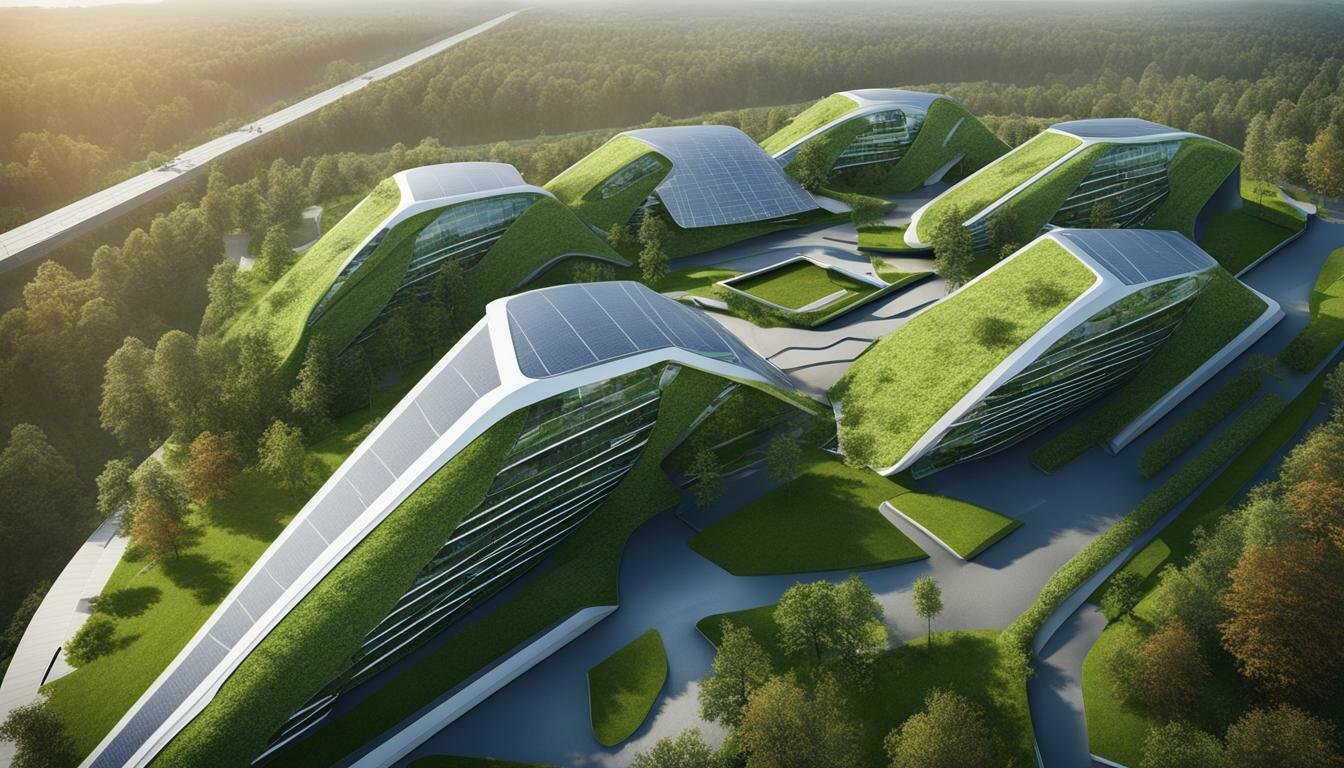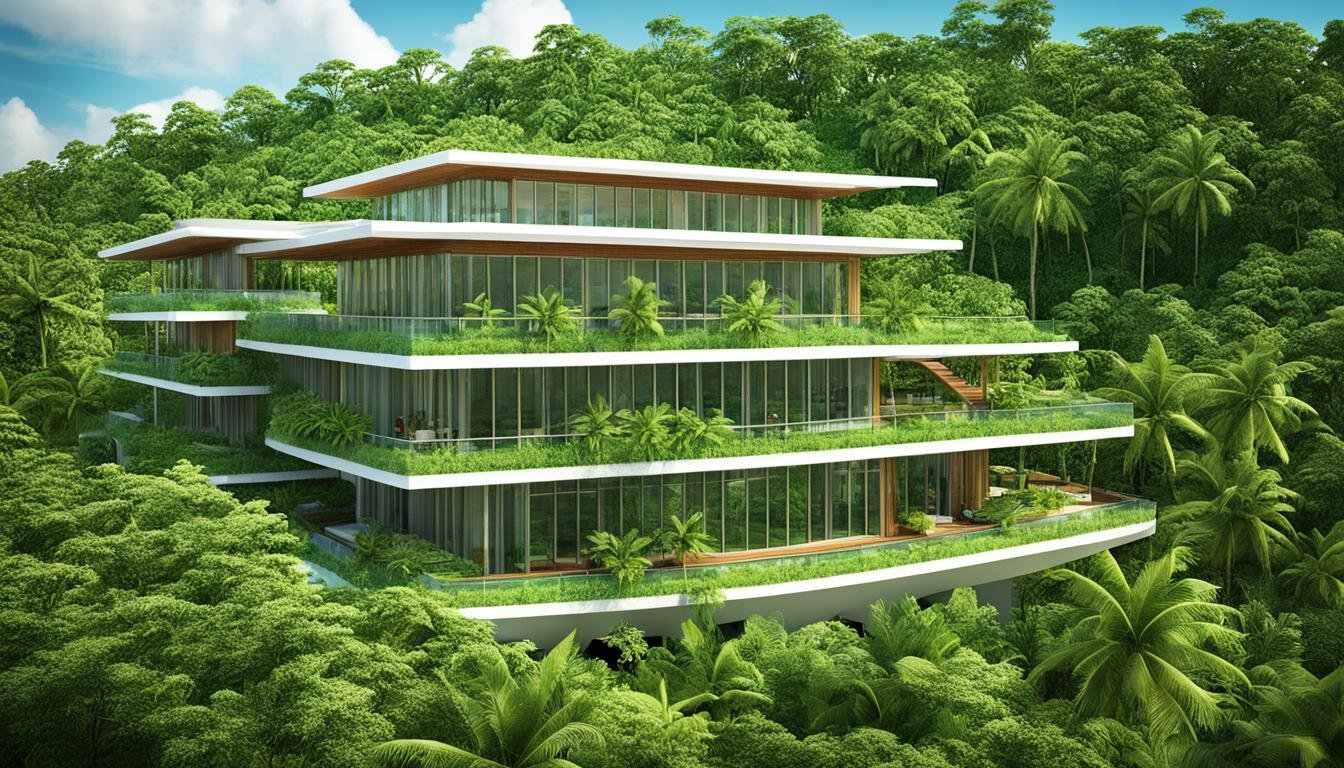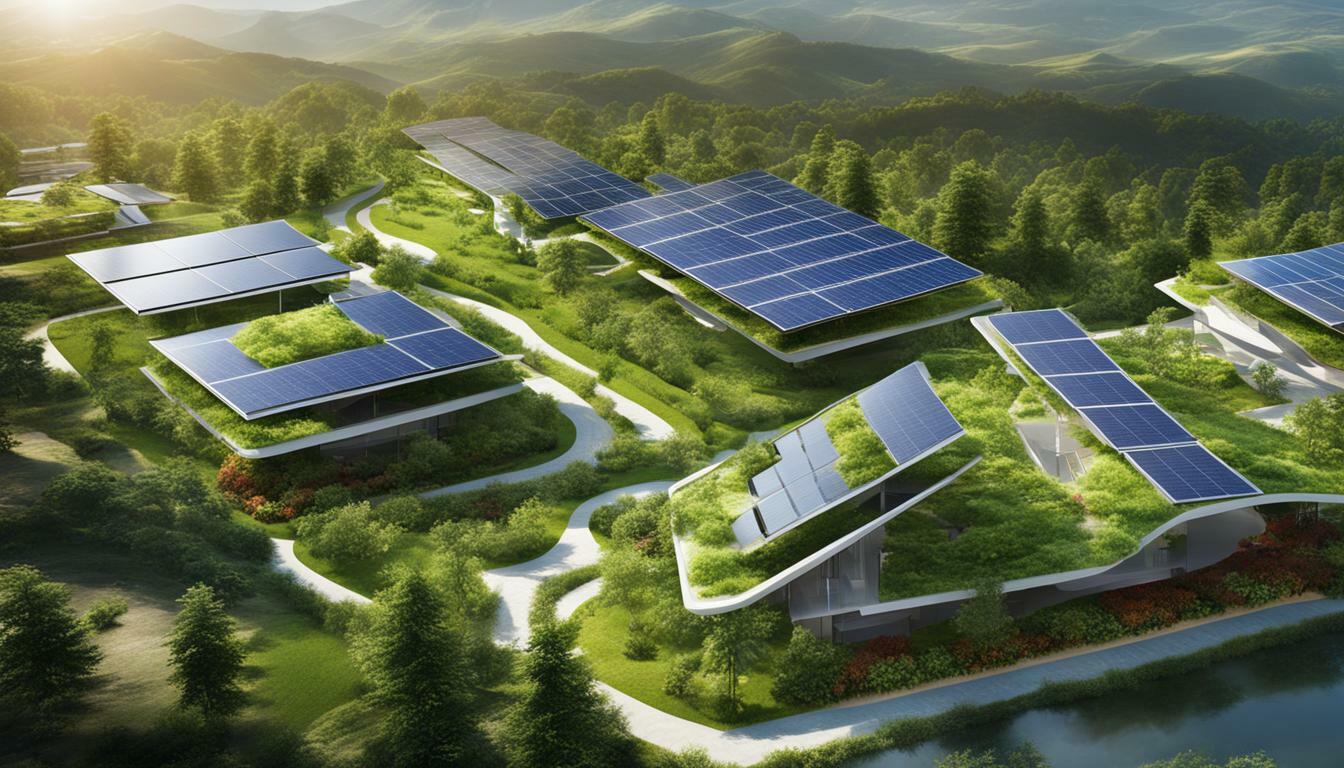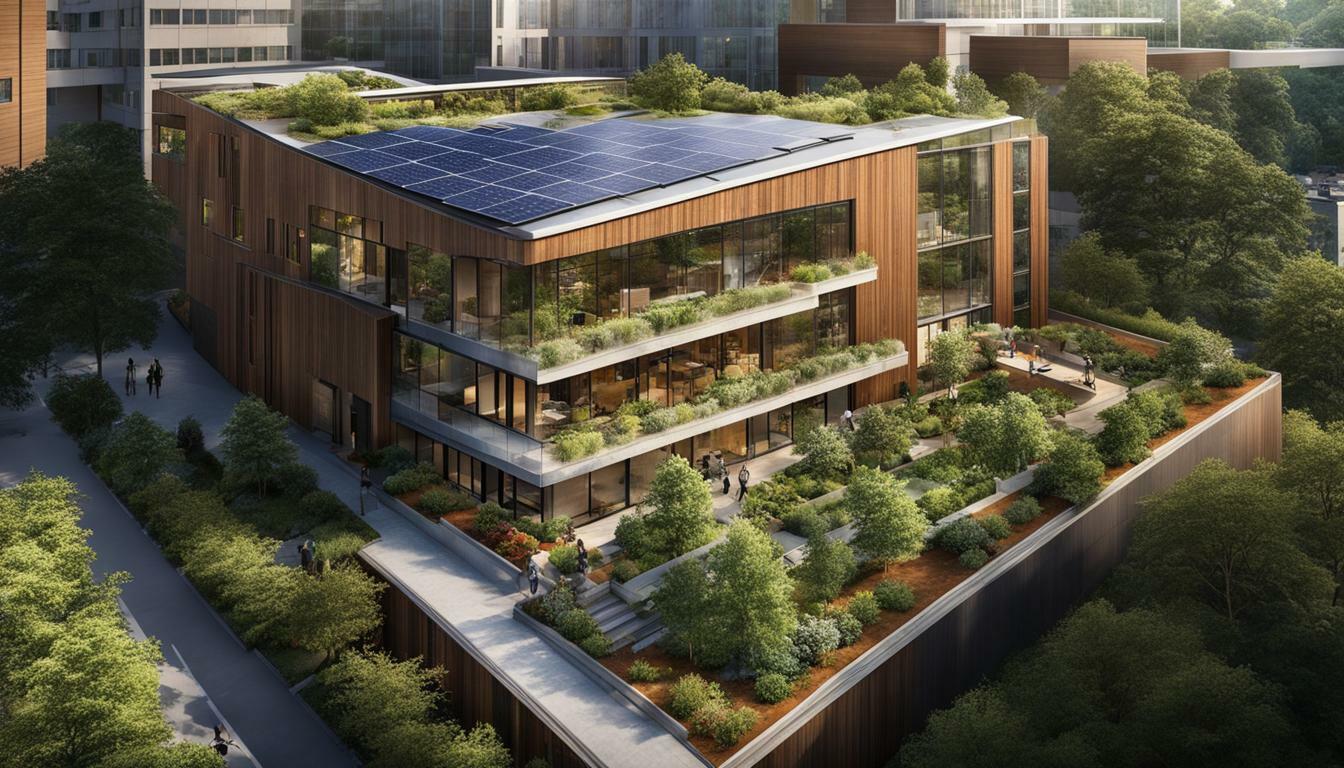Explore Sustainable Living with Benin Green Building
Benin Green Building is a leading organization in promoting sustainable living and environmentally-friendly practices in Benin and beyond. With its innovative approach and commitment to green building principles, Benin Green Building is transforming the construction industry and promoting a more sustainable future.
One of the key aspects of sustainable living is the use of renewable energy sources. Benin Green Building encourages the adoption of solar panels and other renewable energy technologies to reduce reliance on fossil fuels and minimize carbon emissions. By harnessing the power of the sun, households and businesses can generate clean energy and contribute to a greener environment. Additionally, Benin Green Building promotes energy-efficient appliances and lighting systems to further reduce energy consumption and lower carbon footprints.
Another important element of sustainable living is the conservation of water resources. Benin Green Building emphasizes the use of water-saving fixtures and technologies to minimize water wastage. For example, installing low-flow showerheads and dual-flush toilets can significantly reduce water usage without compromising on comfort and convenience. Rainwater harvesting systems are also encouraged to collect and store rainwater for various non-potable uses such as watering plants and cleaning.
The construction industry is a major contributor to environmental degradation and waste generation. Benin Green Building advocates for sustainable construction practices that prioritize the use of locally-sourced materials, such as bamboo and reclaimed wood, which have a lower environmental impact compared to traditional construction materials like concrete and steel. These materials can be easily replenished and have a shorter production cycle, making them more sustainable alternatives.
Furthermore, Benin Green Building promotes the concept of green roofs and walls. Green roofs are covered with vegetation, providing insulation, reducing energy consumption, and improving air quality. Green walls, on the other hand, are vertical gardens that offer similar benefits by filtering pollutants and cooling the surrounding area. These innovative solutions not only enhance the aesthetic appeal of buildings but also contribute to a healthier and more sustainable urban environment.
In addition to sustainable construction practices, Benin Green Building also emphasizes the importance of waste management and recycling. The organization promotes the use of recyclable materials and encourages the implementation of waste segregation and recycling programs at construction sites. By diverting waste from landfills and promoting the reuse of materials, Benin Green Building contributes to a circular economy and reduces the overall environmental impact of construction projects.
To create awareness and foster a culture of sustainable living, Benin Green Building organizes workshops, seminars, and educational campaigns. These initiatives aim to educate individuals, businesses, and policymakers about the benefits of sustainable practices and provide practical solutions for implementation. By engaging stakeholders at various levels, Benin Green Building is working towards creating a more sustainable future for Benin and beyond.
Key Takeaways:
- Benin Green Building promotes sustainable living and green building practices in Benin and beyond.
- The organization encourages the adoption of renewable energy sources such as solar panels to reduce carbon emissions.
- Water conservation and the use of water-saving fixtures are also emphasized by Benin Green Building.
- The organization advocates for sustainable construction practices and encourages the use of locally-sourced, eco-friendly materials.
- Green roofs and walls are innovative solutions that enhance the aesthetic appeal of buildings and contribute to a healthier and more sustainable urban environment.
- Waste management and recycling are important elements of sustainable construction practices promoted by Benin Green Building.
- Benin Green Building organizes workshops, seminars, and educational campaigns to create awareness and promote sustainable living.
Harnessing the Power of Renewable Energy
One of the key aspects of sustainable living is the use of renewable energy sources. Benin Green Building recognizes the importance of reducing reliance on fossil fuels and encourages the adoption of renewable energy technologies in construction projects.
Solar panels are a popular option for generating clean energy and reducing carbon emissions. By harnessing the power of the sun, households and businesses can generate electricity without depleting natural resources or contributing to pollution. Benin Green Building promotes the use of solar panels and helps clients identify the most effective systems for their specific needs and budgets.
In addition to solar panels, Benin Green Building encourages the use of other renewable energy technologies such as wind turbines, hydropower, and geothermal energy. These technologies have minimal environmental impact and can help reduce energy costs in the long run.
To further reduce energy consumption, Benin Green Building also recommends the use of energy-efficient appliances and lighting systems. By replacing conventional light bulbs with LED bulbs and using energy-efficient appliances, households and businesses can significantly reduce their energy consumption and lower their carbon footprints.
Conserving Water Resources
Another important element of sustainable living is the conservation of water resources. Benin Green Building recognizes the significance of water conservation and encourages the use of water-saving fixtures and technologies to reduce water wastage in households and businesses.
Low-flow showerheads and dual-flush toilets are excellent examples of water-saving fixtures that conserve water while still providing optimal comfort and convenience. These fixtures reduce water usage by up to 50%, thereby saving valuable resources and reducing water bills.
In addition to water-saving fixtures, Benin Green Building promotes rainwater harvesting systems as a means to collect and store rainwater for non-potable uses. Rainwater harvesting systems are easy to install and can provide a significant amount of water for activities such as watering plants and cleaning.
By promoting water conservation practices, Benin Green Building is contributing to the efficient and responsible use of this valuable resource. These efforts not only reduce water wastage but also minimize the energy required to transport, treat, and distribute water, thereby reducing carbon emissions and promoting a more sustainable future.

Prioritizing Sustainable Construction Practices
The construction industry is a major contributor to environmental degradation and waste generation. To combat this, Benin Green Building advocates for sustainable construction practices that prioritize the use of environmentally friendly materials and techniques. By incorporating sustainable building materials in construction projects, the organization promotes a more sustainable future and a healthier environment.
Locally-sourced materials such as bamboo and reclaimed wood have a lower environmental impact than traditional construction materials like concrete and steel. Not only are these materials more sustainable, but their production cycle is shorter, making them a more practical alternative. By incorporating sustainable building materials, the construction industry can significantly reduce its carbon footprint and contribute to a healthier planet.
Benin Green Building also encourages the use of energy-efficient appliances and lighting systems in buildings. This reduces energy consumption and lowers carbon footprints. The organization advises the installation of solar panels and other renewable energy technologies to generate clean energy, minimize reliance on fossil fuels, and contribute to a greener environment.
Benin Green Building promotes the use of green roofs and walls, which are covered with vegetation, providing insulation, reducing energy consumption, and improving air quality. These innovative solutions not only enhance the aesthetic appeal of buildings but also contribute to a healthier and more sustainable urban environment. Additionally, the organization emphasizes the need for water conservation and the use of water-saving fixtures and technologies to minimize water wastage. Rainwater harvesting systems are also encouraged to collect and store rainwater for various non-potable uses such as watering plants and cleaning.
Furthermore, Benin Green Building recognizes the importance of waste management and recycling in sustainable construction practices. The organization encourages the use of recyclable materials and the implementation of waste segregation and recycling programs at construction sites. By diverting waste from landfills and promoting the reuse of materials, Benin Green Building contributes to a circular economy and reduces the overall environmental impact of construction projects.
By prioritizing sustainable construction practices, Benin Green Building is driving positive change towards a more sustainable future. The organization provides the necessary tools and solutions to implement these practices in a practical and effective manner. By adopting sustainable building materials and techniques, individuals and businesses can contribute to a greener, healthier, and more sustainable world.

Enhancing Building Design with Green Roofs and Walls
Furthermore, Benin Green Building promotes the concept of green roofs and walls. Green roofs are covered with vegetation, providing insulation, reducing energy consumption, and improving air quality. They also offer additional benefits such as reducing stormwater runoff and noise pollution. Green walls, on the other hand, are vertical gardens that offer similar benefits by filtering pollutants and cooling the surrounding area. They also enhance the visual appeal of buildings and contribute to a more sustainable urban environment.
The use of green roofs and walls is gaining popularity worldwide as an innovative and sustainable solution in building design. Not only do they contribute to energy savings and lower carbon emissions, but they also promote biodiversity and enhance the natural ecosystem.
At Benin Green Building, we believe that the integration of green roofs and walls in building design is crucial in promoting sustainable living. Our team of experts works closely with architects, developers, and building owners to incorporate green roofs and walls into their projects. By doing so, we aim to create buildings that are not only functional and aesthetically pleasing but also environmentally sustainable.

Green roofs can be installed on various types of buildings, from residential homes to commercial buildings. The type and size of the vegetation used on the roof depend on various factors such as the climate, building structure, and maintenance requirements. Some common types of vegetation used on green roofs include sedum, herbs, grasses, and even trees. Regardless of the type of vegetation used, green roofs provide multiple benefits to building owners and the environment.
Green walls, or vertical gardens, are another innovative solution in sustainable building design. They are particularly useful in urban areas where space is limited. Green walls can be installed both indoors and outdoors, making them versatile in their application. By using a variety of plants, green walls can enhance the air quality and aesthetics of a building while also contributing to energy savings and reducing the urban heat island effect.
In summary, the integration of green roofs and walls is a critical element in sustainable building design. They offer multiple benefits to building owners and the environment, from energy savings to enhancing biodiversity. At Benin Green Building, we are committed to promoting these innovative solutions in sustainable building design and contributing to a greener and healthier future for all.
Harnessing the Power of Renewable Energy
Benin Green Building recognizes the importance of renewable energy sources in promoting sustainable living and reducing carbon emissions. The organization encourages the adoption of solar panels, which is a renewable energy technology that harnesses the power of the sun to generate electricity. By generating clean energy, households and businesses can minimize their reliance on fossil fuels and reduce their carbon footprint. Energy-efficient appliances and lighting systems are also recommended by Benin Green Building to further reduce energy consumption and lower carbon emissions.
In addition to promoting renewable energy, Benin Green Building emphasizes the conservation of water resources. By installing water-saving fixtures like low-flow showerheads and dual-flush toilets, households and businesses can minimize water wastage without compromising on comfort and convenience. Rainwater harvesting systems are also encouraged to collect and store rainwater for various non-potable uses such as watering plants and cleaning.
The construction industry is a major contributor to environmental degradation and waste generation. As such, Benin Green Building advocates for sustainable construction practices that prioritize the use of environmentally friendly construction materials in Benin. The use of locally-sourced materials like bamboo and reclaimed wood, which have a lower environmental impact compared to traditional construction materials like concrete and steel, is encouraged by the organization. These materials can be easily replenished and have a shorter production cycle, making them more sustainable alternatives.
Benin Green Building also promotes the use of green roofs and walls to enhance sustainable building design. Green roofs are covered with vegetation, providing insulation, reducing energy consumption, and improving air quality. Green walls, on the other hand, are vertical gardens that offer similar benefits by filtering pollutants and cooling the surrounding area. These innovative solutions not only enhance the aesthetic appeal of buildings but also contribute to a healthier and more sustainable environment.
Managing Waste and Promoting Recycling
In addition to sustainable construction practices, Benin Green Building also emphasizes the importance of waste management and recycling. The organization promotes the use of recyclable materials and encourages the implementation of waste segregation and recycling programs at construction sites. By diverting waste from landfills and promoting the reuse of materials, Benin Green Building contributes to a circular economy and reduces the overall environmental impact of construction projects.

Through its workshops, seminars, and educational campaigns, Benin Green Building seeks to create awareness and foster a culture of sustainable living. These initiatives aim to educate individuals, businesses, and policymakers about the benefits of sustainable practices and provide practical solutions for implementation. By engaging stakeholders at various levels, Benin Green Building is working towards creating a more sustainable future for Benin and beyond.
Conclusion
In conclusion, Benin Green Building is at the forefront of promoting sustainable living and green building practices in Benin. With its innovative approach and commitment to green building principles, it is transforming the construction industry and promoting a more sustainable future. Through its emphasis on renewable energy, water conservation, sustainable construction, waste management, and education, the organization is driving positive change towards a more sustainable and environmentally-friendly future.
By adopting these principles and practices, individuals and businesses can contribute to a greener, healthier, and more sustainable world. This includes the use of renewable energy sources such as solar panels, water-saving technologies, sustainable materials, and waste management strategies. Benin Green Building’s focus on education and awareness also plays an important role in creating a culture of sustainable living.
Overall, Benin Green Building is a testament to the power of sustainable building and its ability to promote a sustainable future. Its commitment to promoting eco-friendly architecture, green building practices, and sustainable design and materials in Benin and beyond is an inspiration to individuals and organizations alike. By incorporating these principles into our daily lives, we can all contribute to a more sustainable and environmentally-friendly future.
FAQ
Q: What is Benin Green Building?
A: Benin Green Building is a leading organization promoting sustainable living and environmentally-friendly practices in Benin and beyond.
Q: What does Benin Green Building focus on?
A: Benin Green Building focuses on renewable energy, water conservation, sustainable construction, waste management, and education.
Q: How does Benin Green Building promote renewable energy?
A: Benin Green Building encourages the adoption of solar panels and other renewable energy technologies to reduce reliance on fossil fuels and minimize carbon emissions.
Q: What measures does Benin Green Building promote for water conservation?
A: Benin Green Building emphasizes the use of water-saving fixtures and technologies, as well as rainwater harvesting systems.
Q: What are sustainable construction practices?
A: Sustainable construction practices prioritize the use of locally-sourced materials, such as bamboo and reclaimed wood, and focus on reducing environmental impact.
Q: What are green roofs and walls?
A: Green roofs are covered with vegetation, providing insulation and improving air quality. Green walls are vertical gardens that filter pollutants and cool the surrounding area.
Q: How does Benin Green Building promote waste management and recycling?
A: Benin Green Building encourages the use of recyclable materials and implements waste segregation and recycling programs at construction sites.








